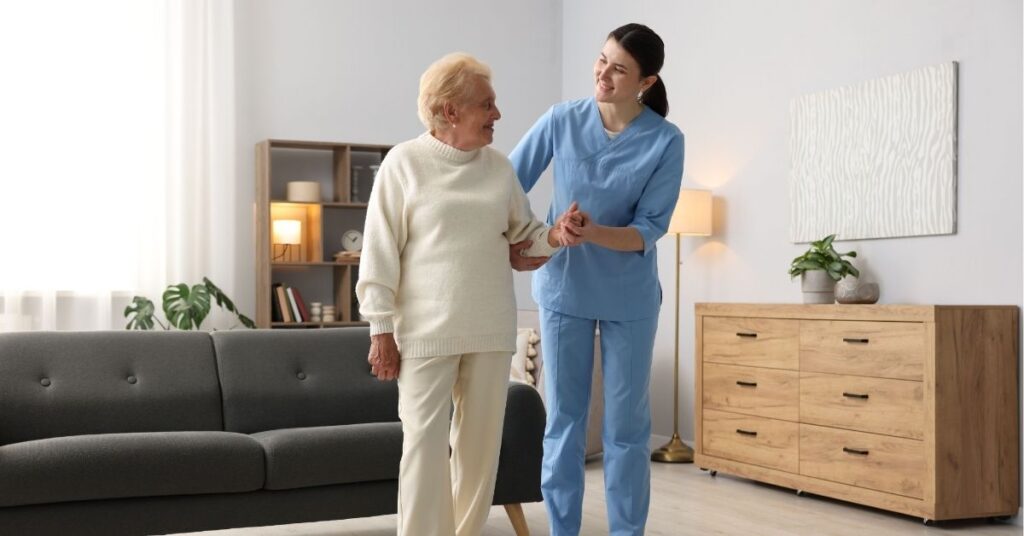
Staff training forms the foundation of quality memory care in Eau Claire, WI and beyond.
When caregivers receive effective training, something remarkable happens—they evolve from well-meaning helpers into skilled professionals who genuinely understand the complex needs of residents living with Alzheimer’s and related dementias.
For families facing the difficult decision of choosing memory care, staff training often determines whether your loved one receives adequate care or truly exceptional support.
Why Training Matters in Memory Care Settings
Lack of proper dementia knowledge by care team members becomes a major factor affecting care quality in memory care settings. Poor communication skills, negative attitudes toward dementia and lack of confidence all contribute to substandard care delivery.
Specialized training gives staff deep understanding of various types of dementia, including Alzheimer, vascular dementia and others. This knowledge helps caregivers recognize how dementia affects cognitive function, behavior and daily living activities differently in each resident.
How training improves resident outcomes
Training creates real, measurable benefits for residents. Numbers matter, but so do the daily moments. With the right training, staff can manage unpredictable resident behaviors and delicate situations with greater ease.
- Recognizing early signs of distress before challenging behaviors escalate
- Implementing non-pharmacological approaches to behavior management
- Creating environments that minimize confusion and anxiety
- Involving families meaningfully in care planning
What to look for in memory care staff
When evaluating memory care in Eau Claire, WI, watch how staff interact and ask about their qualifications. Effective memory care professionals possess certain qualities that signal high-quality care potential.
Look for staff who demonstrate compassion and patience—these traits are essential when working with residents experiencing memory loss. Good memory care staff show flexibility and adaptability, since dementia presents unpredictable challenges requiring caregivers to adjust their approaches quickly.
Training credentials matter too. Staff should have specialized certifications in dementia care, with ongoing education to stay updated with best practices. During community visits, observe how staff communicate with residents. Do they speak clearly, make eye contact and show genuine respect? These interactions often reveal the quality of training they’ve received.

How Training Impacts Residents and Staff
Real change happens when proper training meets daily care. Families searching for memory care in Eau Claire, WI, witness the difference immediately—residents under well-trained caregivers show remarkable improvements that touch every aspect of their lives.
Improved emotional and physical well-being of residents
Watch a resident interact with a properly trained caregiver and you’ll see something beautiful unfold. Their faces light up, anxiety melts away and cooperation replaces resistance. Residents under the care of well-trained staff demonstrate improved emotional states, often becoming noticeably happier and calmer.
The changes run deep. When caregivers apply person-centered approaches learned through training, residents show:
- Better eating habits and improved sleep patterns
- More cooperative behavior during daily care activities
- Reduced agitation and anxiety levels
- Increased social engagement and quality interactions
Higher staff confidence and job satisfaction
Training doesn’t just help residents—it transforms caregivers too. Staff who complete specialized dementia programs feel much more confident in their abilities. This confidence makes a huge difference in how they handle challenging moments.
When you know what you’re doing, your work feels meaningful instead of overwhelming. Caregivers with dementia certification feel more satisfied in their jobs because they find purpose in connecting with residents and seeing how their care makes a real difference.
Here’s where training creates lasting impact: well-trained staff stay. They’re more likely to remain in their positions, which matters enormously for residents who depend on familiar faces and consistent routines. That stability allows deeper relationships to develop between caregivers, residents and families.
Training That Makes a Difference
Staff training forms the heart of quality memory care in Eau Claire, WI. When you’re searching for the right place for someone you love, the difference between good care and exceptional care often comes down to how well the staff understands memory issues and their daily challenges.
We’ve seen how proper training creates real benefits for residents. Well-trained staff members:
- Notice early signs of distress and respond with patience
- Use gentle approaches that reduce anxiety and confusion
- Communicate with respect and genuine understanding
The right training also helps caregivers recognize that each person has their own story, preferences and needs. This personal approach can mean the difference between your loved one feeling lost or feeling truly cared for.
Finding the right memory care solution feels overwhelming, but you don’t have to navigate this alone. Call Heritage Eau Claire at (715) 831-8200 and schedule a tour to see how well-trained staff can build an environment where your loved one can continue to experience joy, connection and respect.
FAQs
Q1. Why does staff training matter so much in memory care?
Training makes a huge difference. When staff are properly trained, they’re better equipped to understand the unique needs of people with memory loss. They learn how to communicate more clearly, respond calmly to difficult behaviors and spot early signs of distress. This leads to a more supportive, less confusing environment for residents—and a more comfortable one too.
Q2. How does staff training help both the residents and the caregivers?
For residents, it means better overall care—improved sleep, better eating habits and fewer moments of agitation. For caregivers, training builds confidence and makes the job more rewarding, which helps reduce stress and burnout. Plus, when staff stick around longer, it creates stronger bonds with residents and their families—something that’s really important in memory care.
Q3. What kind of training do memory care staff actually need?
Staff should get training in several key areas: understanding memory problems, learning how to handle challenging behaviors, improving communication and following emergency protocols. Cultural sensitivity is also important, so everyone feels respected and understood. The best training programs mix classroom learning with hands-on practice, so staff are ready to apply what they’ve learned in real-life situations.

